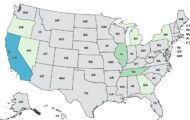Heavy rains during the Cleveland County Fair in North Carolina may have contributed to the spread of E. coli bacteria in the petting zoo which health officials now confirm is the source of an E.coli outbreak that sickened 106 people and killed a small child. Runoff was a likely factor in widespread contamination of the area surrounding the petting zoo exhibit,” according to the North Carolina Department of Health and Human Services.
 “Our sincerest sympathies go to those families that have experienced illness and loss in this outbreak,” State Health Director Laura Gerald said in a statement. “Our goal in this and any other public health investigation is not to assign blame, but to identify how to prevent this kind of event from happening again.”
“Our sincerest sympathies go to those families that have experienced illness and loss in this outbreak,” State Health Director Laura Gerald said in a statement. “Our goal in this and any other public health investigation is not to assign blame, but to identify how to prevent this kind of event from happening again.”
After an E. coli outbreak at the North Carolina State Fair in 2004 sickened 108 people, the North Carolina General Assembly passed legislation to improve safety at petting zoos and other exhibits where contact with animals is allowed. Named after one of the 15 children who were victims of that outbreak, Aedin’s Law outlines specific measures governing animal contact exhibits including: fencing and staffing around exhibits, education to inform the public of health and safety issues, and adequate hand washing facilities.
E. coli bacteria live in the intestines of people and animals. If ingested, these bacteria can cause illness with symptoms that include abdominal cramping and bloody diarrhea. In some cases, a condition called hemolytic uremic syndrome (HUS), which leads to kidney failure, can develop. HUS most often affects small children and seniors.
A public health investigation into the Cleveland County Fair outbreak began October 8 and included a case control study of two groups of fairgoers: those who became ill and those who didn’t. In all, health officials conducted 266 interviews.
This week, a 12-year old boy who was sickened with E.coli poisoning after the attending the fair was released from the hospital after a 35-day stay. And a 5-year-old girl who had ben released from the hospital, was readmitted with complications from the E. coli infection.




